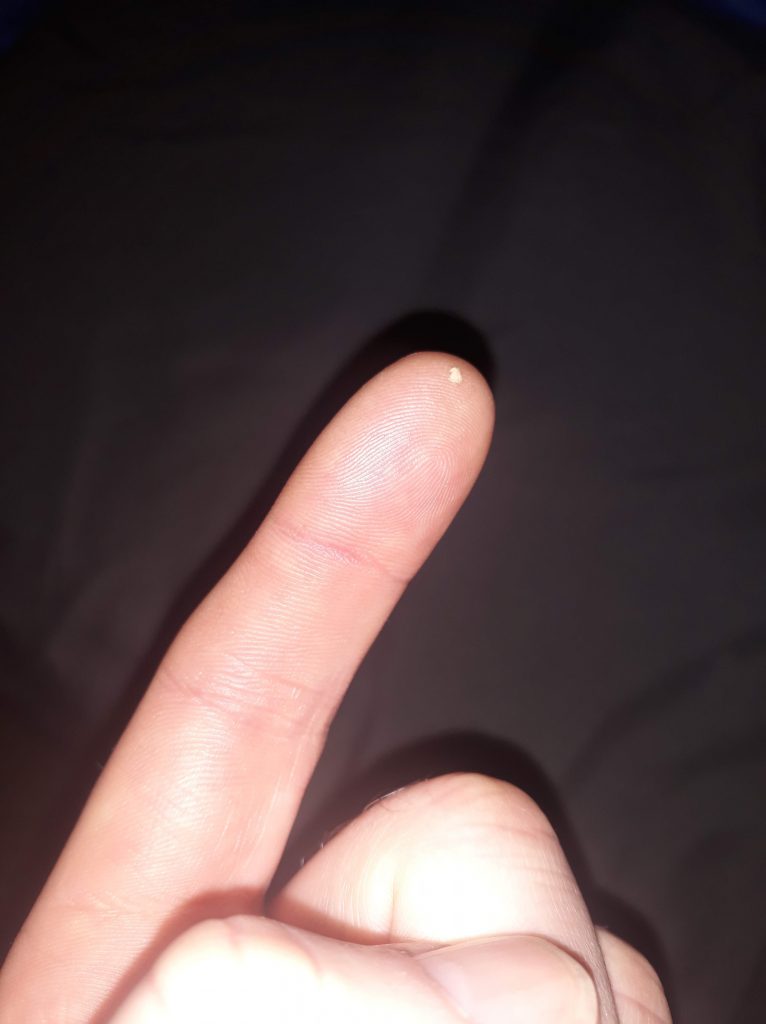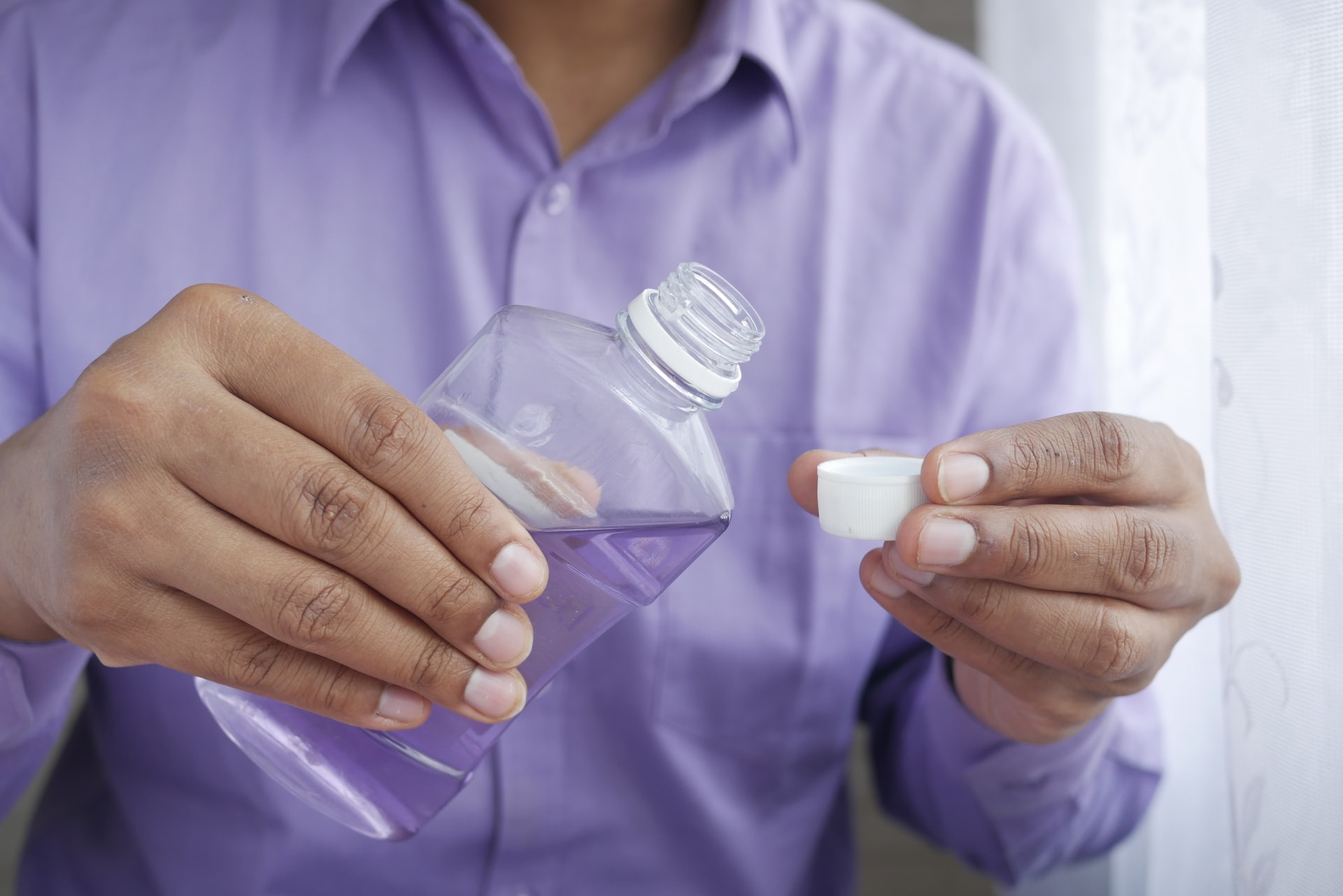Tonsil stones are a leading cause of discomfort in the throat and chronic bad breath. Often these stones may hide behind our tonsils where we can’t see them, but you can certainly smell them.
If you suspect you have tonsil stones, there are remedies to help treat and prevent the condition, including the use of mouthwashes. However, not all mouthwash is equally effective.
The best mouthwash for tonsil stones that actually works is TheraBreath Oral Rinse , which is vegan and was developed by a tonsil stone expert. Other options include CloSYS Sensitive Mouthwash
, which is vegan and was developed by a tonsil stone expert. Other options include CloSYS Sensitive Mouthwash for a more gentle action, Betadine mouthwash, and making your own gargle.
for a more gentle action, Betadine mouthwash, and making your own gargle.
There is no need to be ashamed if you have tonsil stones, and there are safe and effective ways to manage the condition if the case is moderate. If you wish to learn more about what causes tonsil stones and how to treat them, here are some tips on the best mouthwash to use.
Which Mouthwash You Should Use for Tonsil Stones
Certain mouthwashes have been proven to work for tonsil stones, in both the prevention and treatment stages. However, not every mouthwash works for this condition, and some, such as alcohol-based mouthwashes, may even make the condition worse.
Here are four mouthwashes you can use to help with tonsil stones:
- TheraBreath Fresh Breath Oral Rinse.
- CloSYS Sensitive Mouthwash.
- Betadine Povidone-Iodine Mouthwash and Gargle.
- Saltwater Gargle.
Gargling with an effective antimicrobial mouthwash helps dislodge debris from the tonsil crevasses and inhibit the harmful bacteria associated with the calcification of particles in the tonsils.
Regular gargling with an effective mouthwash also decreases the likelihood that food particles become trapped in the tonsil crevasses.
Alcohol-based mouthwashes tend to dry the mouth and oral mucosa and increase cell shedding  associated with tonsil stones and tongue saburra.
associated with tonsil stones and tongue saburra.
The American Dental Association  advises that consumers avoid cosmetic mouthwashes that only provide temporary breath freshening and flavor but have no effect on volatile sulfur compounds.
advises that consumers avoid cosmetic mouthwashes that only provide temporary breath freshening and flavor but have no effect on volatile sulfur compounds.
They also suggest that those seeking effective mouthwash should include active ingredients such as:
- Chlorhexidine
- Chlorine dioxide
- Cetylpyridinium chloride
- Essential oils such as eucalyptol, menthol, thymol, and methyl salicylate
- Peroxide
- Fluoride
Let’s take a closer look at our recommended mouthwash options.
Best Overall: TheraBreath Fresh Breath Oral Rinse
Developed by Dr. Harold Katz , a recognized expert in tonsil stones, this mouthwash is a 100% Vegan formulation to effectively eliminate the bacteria responsible for bad breath and tonsil stones.
, a recognized expert in tonsil stones, this mouthwash is a 100% Vegan formulation to effectively eliminate the bacteria responsible for bad breath and tonsil stones.
A clinical study conducted in 2015 on 50 volunteers showed that a mouthwash containing certain ingredients outperformed the placebo substantially in forming caseous and tongue coating formations.
on 50 volunteers showed that a mouthwash containing certain ingredients outperformed the placebo substantially in forming caseous and tongue coating formations.
The Halitus® company brand behind the TheraBreath range showed effective results in preventing tonsil stone formation.
Therabreath Mouthwash Pros
- ADA Approved
- 100% Vegan, gluten-free product
- Effective for 24 hours
- Removes harmful bacteria from the mouth and tonsils.
- Oxygenating formula to prevent tonsil stone build-up.
Therabreath Mouthwash Cons
- Users need to use it in conjunction with a kit specifically for tonsil stones.
- Expensive
For Sensitive Mouths: CloSYS Sensitive Mouthwash
CloSYS mouthwash is an American Dentists Association (ADA) approved mouthwash that gently and effectively eliminates harmful bacteria in the mouth and throat. The ingredients are safe and eliminate the burning sensations and taste effects common in antibacterial mouthwash.
CloSYS Mouthwash Pros
- Free of dyes
- Contains no Triclosan
- Sulfate-free
- Alcohol-free
- Gluten-free
- The mouthwash cleans 99.9% of germs in the mouth.
CloSYS Mouthwash Cons
- Flavorless
Best Broad Spectrum Antimicrobial: Betadine Povidone-Iodine Mouthwash and Gargle
Clinical studies have shown that Povidone-Iodine offers one of the best antimicrobial actions in the mouth and throat, including back to the tongue, tonsils, and side and back walls of the throat.
have shown that Povidone-Iodine offers one of the best antimicrobial actions in the mouth and throat, including back to the tongue, tonsils, and side and back walls of the throat.
Povidone-iodine offers the broadest spectrum of antimicrobial action compared to common oral antiseptics such as chlorhexidine.
Betadine Mouthwash and Gargle Pros
- It kills germs that cause throat infections.
- Contains povidone-iodine a broad-spectrum antimicrobial povidone-iodinePVP-1 1% w/v
- A 30-second gargle is effective against bacteria in the mouth and throat.
- It Soothes the irritation and discomfort of a dry throat.
- 0.5% PVP-I is effective in reducing SARS-CoV-2 in the nose, mouth, and throat

Betadine Mouthwash and Gargle Cons
- Mouthwash contains alcohol
Best Home Remedy Mouthwash for Tonsil Stones: Saltwater Gargle
A clinical study found that saltwater was just as effective in decreasing plaque and microbes in the mouth as chlorhexidine, a common ingredient in antibacterial mouthwash.
Although chlorhexidine had a more significant effect on eliminating oral bacteria, saltwater gargles are cheaper and effective with fewer potential side effects.
We have written a few recipes for making your own tonsil stone gargle at home:
- Take half a teaspoon of salt and mix it in around 120ml (4oz) of warm water (pre-boiled).
- Swish the saltwater around your mouth and tip your head back to gargle for a few seconds.
- Rinse with regular water if you wish.
What Is a Tonsil Stone?

Tonsil stones are hardened material that collects in the tonsils’ crevices. Tonsil stones are made up of material including food particles, saliva, dead cells, and mucus. This material attracts bacteria and fungi, releasing sulfur compounds that cause bad breath and varying levels of discomfort .
.
When the material hardens within the tonsil, it becomes what doctors refer to as tonsilloliths, tonsil calculi , or tonsil stones. Tosolliliths appear as a white or yellowish mass and may range from 0.3 g to 42 g
, or tonsil stones. Tosolliliths appear as a white or yellowish mass and may range from 0.3 g to 42 g (0.01 oz to 1.48 oz).
(0.01 oz to 1.48 oz).
The largest tonsillolith on record was a staggering 14cm (5.5 inches)
(5.5 inches)
Clinical studies offer varying percentages of the occurrence of tonsil stones in patients. The discrepancy rests on the fact that often patients have hidden stones and that specific imaging is more likely to reveal tonsil stones.
However, in a case study of 49 patients, researchers found that 75% of the patients exhibiting signs of chronic bad breath presented with tonsilloliths compared to only 6 percent with normal breath .
.
What Causes Tonsil Stones?
The most common cause of tonsil stones is chronic tonsillitis – inflammation of the tonsils. Recent medical surveys suggest that biofilms – clusters of bacteria – also have a role to play in tonsil stone formation.
Bacterial biofilms form a three-dimensional structure that prevents antibiotic action and host defenses, increasing the likelihood of reinfection and the occurrence of tonsillitis and associated tonsil stones .
.
Other causes include:
- Patients with a poor history of oral hygiene.
- Patients who suffer from excess mucus from a post nasal drip.
- Patients who experience chronic sinus issues.
- Genetic preponderance too deep tonsil crevasses or crypts.
- Dry mouth conditions related to medication.
- The patient’s dietary or lifestyle factors may contribute to tonsil stones such as alcohol and cigarettes.
What Are the Signs of Tonsillitis?

Tonsil stones are often hidden from a sufferer’s view and embedded in the folds of the tonsils.
Usually, patients only realize the presence of the stones in dental x-rays or medical radiographs. However, there are specific symptoms you should be aware of that indicate you may suffer from tonsilliths.
These symptoms include the following.
- Persistent throat pain. Tosolillths often cause pain in the throat that is difficult to distinguish from tonsillitis.
- Difficulty swallowing. Tonsil stones often present discomfort to sufferers in the form of a feeling of something stuck in the throat or difficult swallowing (Dysphagia).
- Persistent ear pain. Although tonsil stones are separate from the ear, there are shared nerve pathways between the affected area and the ear, which may cause a referred pain in the ear itself.
- There is visible white material in the tonsils. Although tonsil stones may hide from the naked eye, sometimes, you may see yellowish-white deposits at the back of the throat.
- Enlarged and inflamed tonsils. Often the tonsils react to the embedded stones by becoming larger or visibly inflamed.
- Sufferers have halitosis or chronic bad breath. One of the primary symptoms of tonsil stones is the bad breath caused by the sulfur compounds released in bacterial activity.
How To Prevent Tonsil Stones
Depending on the severity of your tonsil stones, there are specific changes you can make to treat the condition and prevent further flare-ups.
Severe cases may have to opt for surgical procedures, but sufferers can often manage the less severe cases independently.
Tips on avoiding tonsil stones include:
- Treat the underlying condition. If you suffer from sinus or postnasal drip, you should seek to remedy the condition before tackling the tonsil stones.
- Watch what you eat. Dairy products such as cheese, milk, and yogurt may contribute to tonsil stone formation. Sufferers should eliminate all carbonated drinks as well as alcohol and tobacco products. Check out our diet tips for tonsil stones.
- Maintain good oral hygiene. Regular teeth brushing and flossing may help the build-up of debris in your tonsils.
- Keep hydrated. Drinking plenty of water a day will help your throat stay hydrated and present drying out associated with tonsil stone formation.
- Gargle regularly. Choose an antibacterial gargle from the above list or use salt water to gargle after each meal to eliminate debris building up in the tonsil cavities.
Final Thoughts
Evidence suggests that tonsil stones are far more prevalent than experts assume, and many suffer from this uncomfortable and embarrassing condition.
Tonsil stones are treatable, and if the condition is moderate, you may manage your tonsils at home without seeking medical attention. Check out our blog for more tips and tricks for living a tonsil-stone-free life.
for living a tonsil-stone-free life.
However, if your tonsilloliths are causing you pain and inflammation, you should always seek professional medical advice.


